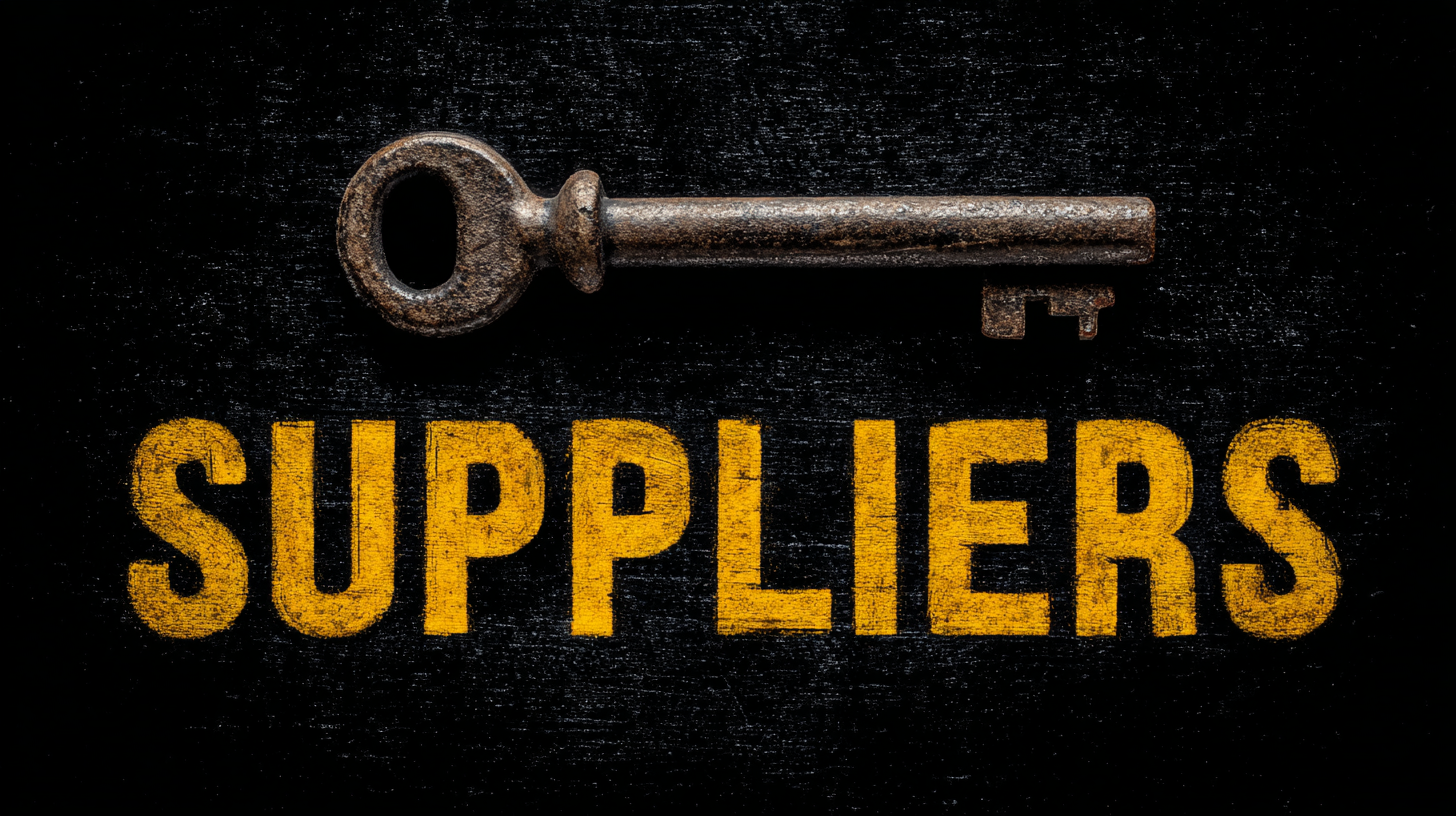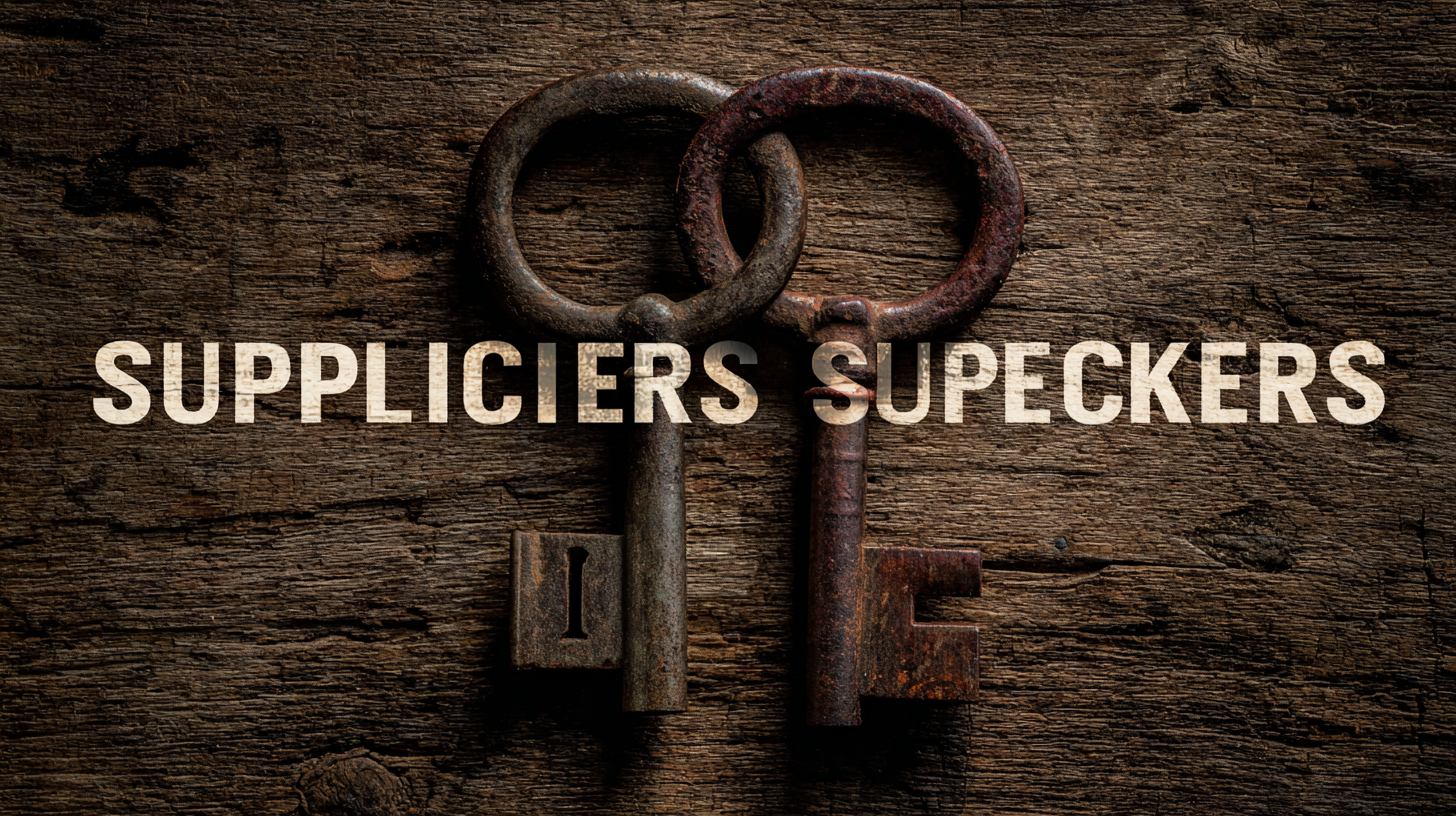- English
- русский
- العربية
- tiếng Việt
- Türkçe
- Deutsch
- 日本語
- 한국어
- ภาษาไทย
- Indonesia
- שפה עברית
- Português
- Español
- Français
- Italiano
- Nederlands
- Polski
- Svenska
- magyar
- Malay
- বাংলা ভাষার
- Dansk
- Suomi
- हिन्दी
- Pilipino
- Gaeilge
- تمل
- český
- ελληνικά
- український
- Javanese
- فارسی
- தமிழ்
- తెలుగు
- नेपाली
- Burmese
- български
- ລາວ
- Latine
- Қазақша
- Euskal
- Azərbaycan
- Slovenský jazyk
- Македонски
- Lietuvos
- Eesti Keel
- Română
- Slovenski
- मराठी
- Srpski језик

Unlocking the Secrets to Finding the Best Suppliers for Your Business Success
In today's competitive business landscape, the significance of choosing the right suppliers cannot be overstated. According to a report by Statista, over 60% of companies indicate that effective supplier management directly contributes to their overall business success. With supply chain dynamics becoming increasingly complex, businesses must adopt a strategic approach to sourcing suppliers that align with their operational goals. The right suppliers not only provide quality products but also enhance efficiency, reduce costs, and improve time-to-market.

As we delve deeper into the strategies for identifying and engaging with the best suppliers, understanding their impact on your business’s success will be critical. By unlocking these secrets, companies can not only foster strong partnerships but also position themselves for sustained growth and competitiveness in their respective markets.
Identifying Top Supplier Characteristics: 5 Key Traits for Business Growth
Finding the right suppliers is crucial for the growth and success of any business. When evaluating potential partners, it's essential to focus on key traits that indicate their ability to contribute effectively to your operations. Here are five characteristics to consider when identifying top suppliers.
First and foremost, reliability is a non-negotiable trait. A dependable supplier consistently delivers on time and meets quality standards, minimizing disruptions in your supply chain. To assess reliability, check their track record through client testimonials or reviews. Additionally, maintaining open lines of communication can foster transparency, which is vital for building trust.
Next, look for suppliers who demonstrate adaptability. The business landscape is ever-changing, and a supplier's ability to pivot and adjust to your specific needs can often make or break a partnership. Engage in discussions about their experience with scaling operations or accommodating last-minute changes.
Lastly, consider suppliers that prioritize sustainability. A commitment to eco-friendly practices not only aligns with modern consumer preferences but also positions your business competitively in the market. Seek out suppliers who can provide certifications or evidence of sustainable sourcing, which can be an added value for your brand.
Leveraging Data Analytics: 7 Strategies to Assess Supplier Performance
In today's competitive marketplace, organizations must adopt data-driven approaches to assess and optimize their supplier performance. Leveraging data analytics enables businesses to uncover insights that can inform decision-making and improve supplier relationships. One effective strategy is to establish key performance indicators (KPIs) tailored to your specific industry needs. By measuring aspects like delivery times, quality of goods, and responsiveness to requests, businesses can create a comprehensive scorecard that highlights both strong performers and areas needing improvement.
Another powerful strategy involves using predictive analytics to identify potential issues before they arise. By analyzing historical data, organizations can forecast trends, such as supply chain disruptions or shifts in demand, and proactively engage with suppliers to mitigate risks. Additionally, incorporating feedback mechanisms, such as supplier surveys, allows companies to collect qualitative data that complements quantitative analytics. This holistic approach ensures a deeper understanding of supplier performance and fosters a collaborative environment where continuous improvement is prioritized, ultimately paving the way for sustainable business success.
Supplier Performance Assessment
This chart represents the evaluation of different suppliers based on key performance indicators (KPIs) such as Quality, Delivery Timeliness, Cost Efficiency, and Customer Service. The scores are based on a scale of 0 to 100.
Building Strong Supplier Relationships: 6 Steps to Ensure Mutual Success
Building strong supplier relationships is crucial for any business looking to thrive in a competitive market. The first step in this process is to communicate clearly and consistently. Establishing open lines of communication ensures that both parties understand expectations, timelines, and any challenges that may arise. Regular check-ins can help address concerns before they escalate, fostering a sense of collaboration rather than mere transactions.
Another essential step is to invest in mutual growth. A successful partnership goes beyond pricing and delivery; it involves sharing insights, resources, and even training opportunities. By working together to improve processes and innovate, both businesses can enhance their competitiveness. Recognizing your suppliers as valuable partners fosters loyalty and encourages them to prioritize your needs, leading to better service and reliability in return. Together, these steps will pave the way for a more resilient and successful business relationship.
Unlocking the Secrets to Finding the Best Suppliers for Your Business Success
| Supplier Category | Rating (1-5) | Lead Time (Days) | Minimum Order Quantity | Payment Terms | Communication Score (1-5) |
|---|---|---|---|---|---|
| Raw Materials | 4 | 15 | 500 kg | Net 30 | 4 |
| Components | 5 | 10 | 100 pcs | Net 45 | 5 |
| Packaging | 3 | 20 | 2000 units | Net 30 | 3 |
| Logistics | 4 | 5 | - | Prepaid | 4 |
| Manufacturing | 5 | 30 | 50 pcs | Net 60 | 5 |
Optimizing Supplier Networks: 4 Trends to Watch in Supply Chain Management
In today’s competitive landscape, optimizing supplier networks is crucial for business success. As the logistics and supply chain sector evolves, keeping an eye on emerging trends can help your business stay ahead. One significant trend is the increasing integration of generative artificial intelligence in procurement and operations. This disruptive technology is enhancing decision-making processes, enabling companies to streamline their supplier selection and management, ultimately leading to improved efficiency and cost savings.
When searching for the best suppliers, consider utilizing data analytics to assess supplier performance and market trends. Employ tools that allow for real-time evaluation, which can reveal insights into supplier capabilities and reliability. Additionally, establishing strong communication channels with potential suppliers can facilitate better negotiations and foster solid partnerships.
Lastly, understanding the importance of sector-specific needs can aid in choosing the right suppliers. For industries like automotive or healthcare, it's essential to partner with suppliers who not only meet regulatory requirements but can also adapt to industry-specific challenges. By being strategic and informed, businesses can find suppliers that align with their long-term goals and enhance the overall supply chain performance.

Evaluating Cost Efficiency: How to Measure Supplier ROI for Competitive Advantage
When evaluating suppliers, measuring return on investment (ROI) is crucial for ensuring cost efficiency and maintaining a competitive edge. Start by analyzing direct costs associated with each supplier, such as pricing agreements and shipping fees. However, it's equally important to consider indirect factors, like lead times and product quality, as these can significantly impact overall ROI. Engaging in a cost-benefit analysis can help you identify suppliers offering the most value while keeping expenses in check.
Tip: Develop a scoring system to compare suppliers based on multiple criteria, including pricing, reliability, and customer support. This systematic approach helps in visualizing which suppliers can contribute the most to your revenue.
Furthermore, look beyond short-term costs; assess suppliers on their potential for long-term collaboration and stability. A reliable supplier may charge slightly higher prices but offer benefits like enhanced service, which can lead to increased customer satisfaction and loyalty.
Tip: Establish key performance indicators (KPIs) for your suppliers that align with your business goals. Regularly reviewing these KPIs will enable you to make informed decisions about supplier retention and negotiation.

